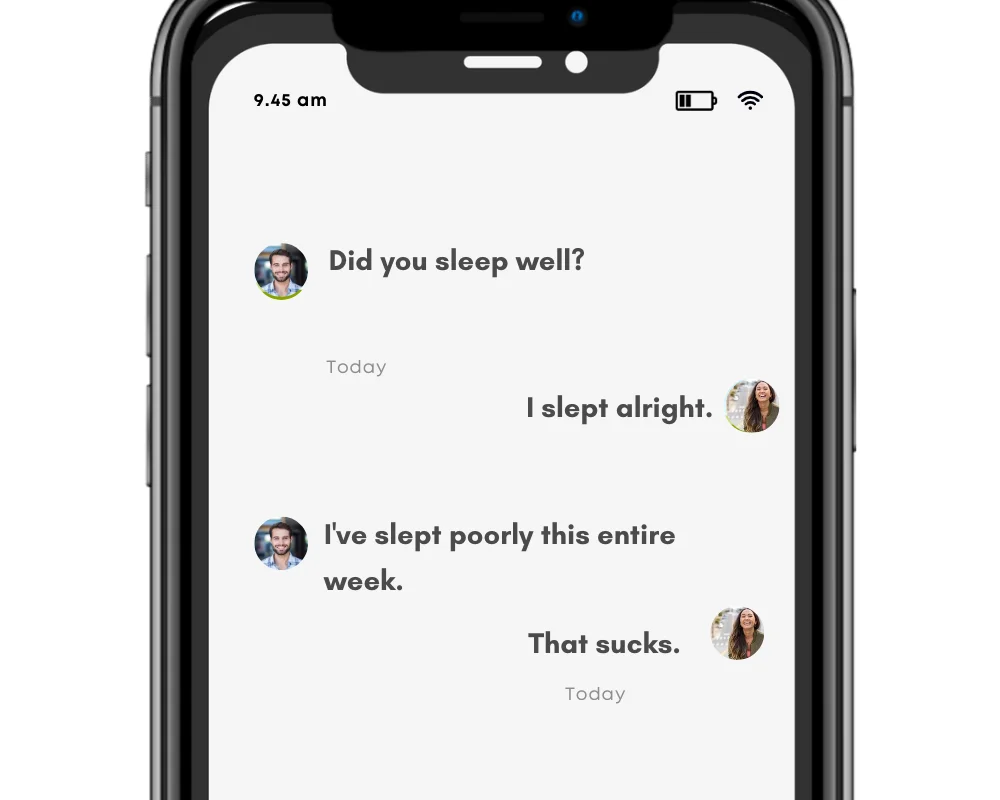
Contents
Toggle
What’s the past tense of “sleep”? Sleeped or slept?
What’s the past tense of the verb sleep? Is it sleep, sleeped, or slept ? If you guessed sleeped, you may need to flex your grammar skills more often. Stick around—stay awhile.
Forms of the irregular verb sleep
Let’s define the topic first. The verb sleep, as described by Collins Dictionary, “sleep is the natural state of rest in which your eyes are closed, your body is inactive, and your mind does not think.”
| present | past | future | |
| simple | I sleep | I slept | I will sleep |
| continuous | I am sleeping | I was sleeping | I will be sleeping |
| perfect | I have slept | I had slept | I will have slept |
| perfect continuous | I have been sleeping | I had been sleeping | I will have been sleeping |
Is sleep a regular or irregular verb?
The verb sleep is irregular because it does not end in -ed in either its past tense or past participle form. The difference between regular and irregular verbs is:
Regular verbs end in –ed in their past tense forms. Irregular verbs end in something other than –ed.
The verb sleep belongs to the class of irregular verbs with 2 different verb forms. Here’s a chart of other irregular verbs within the same group.
| base verb | past tense | past participle |
| dream | dreamed/dreamt | dreamed/dreamt |
| burn | burned/burnt | burned/burnt |
| sleep | slept | slept |
| leap | leapt/leaped | leapt/leaped |
| lean | leant/leaned | leant/leaned |
| smell | smelled/smelt | smelt/smelled |
What’s the past tense of sleep? Sleeped or slept?
The simple past tense of sleep (rhymes with sheep) is slept (rhymes with wept). But what’s the difference between the simple past tense slept, and the past participle slept? Both forms of the verb are the same and are just slept, so is there even a difference to mention? See a comparison of the past forms of sleep in context as a simple past tense and a past participle:
I only slept two hours. (simple past)
I wish I had slept more last night. (past participle in the past perfect tense)
Both are in the past tense, and so describe actions or states that have been completed entirely in the past. However, there is still a distinction, though it may not be immediately obvious. What gives away the second sentence as a past participle is the auxiliary that precedes slept, e.g., had. This combination creates the past perfect tense. To create the present perfect, we’d use have + past participle verb form, [slept].
“Sleep” in the present tense (example sentences)
Try and get some sleep.
They were exhausted from lack of sleep.
Last night was very hot and muggy and I didn’t sleep very well.
The noise woke her from a deep sleep.
I couldn’t sleep last night.
“Slept” in the past tense (example sentences)
He slept soundly.
I only slept two hours last night.
I slept well last night.
I slept drowsily with a good feeling for about 2 hours, while rocked by the train.
5. We slept under the open sky.
Examples of slept in the past participle
I had slept for twelve hours by the time I woke up.
The baby had slept through the entire night for the first time.
She was exhausted after having slept poorly the night before.
The students had all slept in and were running late for class.
We had slept in a tent during our camping trip.
Practice questions: forms of “sleep”
| Questions | Answer options: |
|---|---|
| 1. True or false: “Sleep” is a regular verb. | a. true b. false c. both |
| 2. True or false: “To sleep” looks the same in the present and past tense. | a. true b. false |
| Choose the correct verb form to complete each sentence: | |
| 3. Try and get some ___. | a. sleeping b. slept c. sleep |
| 4. He ___ soundly. | a. slept b. sleeping c. sleep |
| 5. They’ve been ___ the entire day. | a. slept b. sleeping c. sleep |
| 6. I will go ___ in about an hour or so. | a. to sleep b. sleeping c. slept |
Answers
- b
- b
- c
- a
- b
- a
Origin of the word “sleep”
From etymology online on sleep (v.):
Old English slæpan “to be or fall asleep; be dormant or inactive” (class VII strong verb; past tense slep, past participle slæpen), from Proto-Germanic *slēpanan.
Learn more about verbs
- What are regular and irregular verbs?
- Transitive and intransitive verbs?
- What are verbs?
- What’re personal pronouns?
- What’s the difference between they’re, their, and there?
- Whose vs who’s?
Sources
- Merriam-Webster, definition of sleep.
- Etymology online, origin of sleep.











